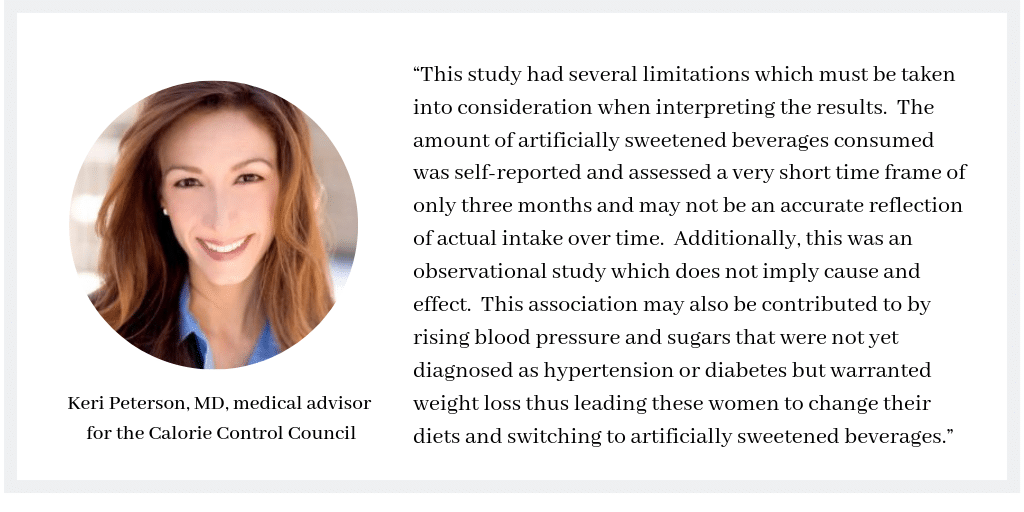
Mossavar-Rahmani Y, Kamensky V, Manson JE, et al. Stroke 2019; 50:00-00. DOI:10.1161/STROKEAHA.118.023100
ATLANTA, GA (February 14, 2019) — The Calorie Control Council (CCC) strongly recommends careful interpretation of the findings of this study. The likelihood of residual confounding from risk factors that can contribute to cardiovascular disease (CVD) and stroke is very high, making it inappropriate to point to the consumption of low- and no- calorie sweeteners as the cause of the events reported. Additionally, the contribution of reverse causality, meaning that individuals already at a greater risk of stroke and cardiovascular events chose low-calorie sweetened beverages, is very likely the cause of the associations presented by these researchers.
Robert Rankin, president of the Calorie Control Council, notes “The Calorie Control Council cautions against drawing conclusions from this study. Observational studies attempt to associate behaviors with outcomes but cannot prove cause and effect. It is likely study subjects were already at a greater health risk and chose low-calorie sweetened beverages to manage their calorie and sugar intake as these products are proven safe and beneficial for those managing their weight and blood glucose levels. These study results paint an inaccurate picture of the important role of these products for consumers.”

The contribution of reverse causality, meaning that low-calorie sweetened beverages were chosen by individuals already at a greater risk of stroke events due to health risks, is likely responsible for the associations being presented by the researchers.
The study results were dependent on self-reported consumption looking back over three months, which is subject to misreporting and was not validated via other assessment measures in this study. Further, the study does not document the complete diet of the subjects, so it is unclear what other foods and beverages could have contributed to the elevated risk of cardiovascular events. Additionally, baseline data used in this study suggested that women with high intakes of artificially sweetened beverages were more likely to be obese, have poorer diet quality, consume more calories and have a history of diabetes mellitus or stroke. This suggests that there may be other factors that attribute to their CVD event risk that were not isolated or accounted for in this study.
The observational study has significant limitations and is unable to prove a causal relationship between artificial sweeteners and stroke. Observational data can be used to make associations, but is not intended to be used to draw conclusions about any variables and health outcomes. Therefore it is irresponsible to draw conclusions about the consumption of low-calorie sweetened beverages and potential risks of stroke and CVD.